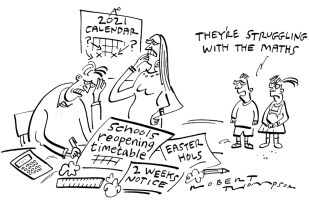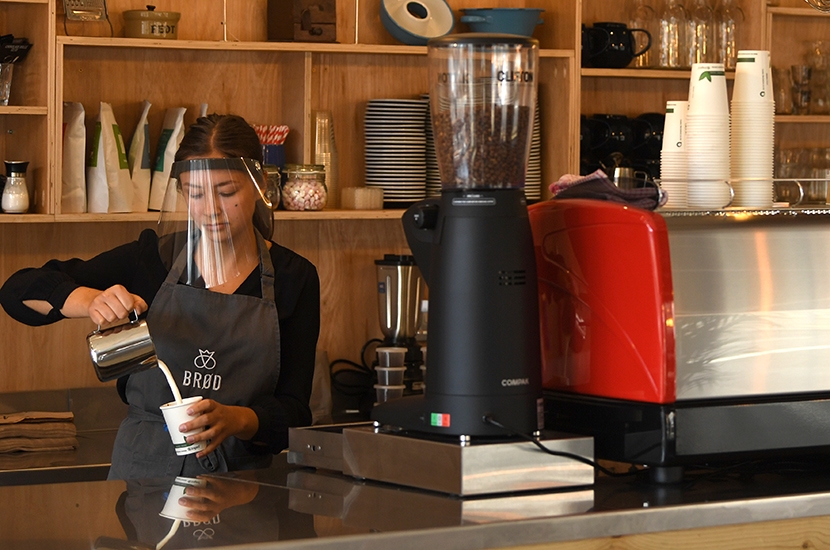A common sight across Britain these past ten months has been those rainbow flags fluttering in urban and village streets: ‘Thank you NHS.’ Many add an afterthought: ‘And other key workers.’ And who would dispute either sentiment?
To these expressions of gratitude are added ministers’ and their medical advisers’ thanks to everyone who just ‘stays home’. We are saving granny. We are, if only by inaction, doing our bit in a great national effort, pulling together with the team. We join the ranks of the public-spirited, the selfless, the just. And again, who would cavil? Prudence, caution, carefulness… in a pandemic these are needed qualities.
But there’s a group of our fellow citizens whose efforts during these pandemic times have gone somewhat unremarked. Many, many of these people have been doing this by choice; others out of necessity; all of them accepting an enhanced risk by leaving home.

I am not talking here about the ‘key workers’: NHS staff, police, council employees and other (often) public-sector workers whose contribution has been so important. They’ve been everywhere noticed and — sometimes to their embarrassment — praised.
No, I’m talking about the millions, mostly in the private sector, who have kept the economy ticking over by deciding to carry on with business as usual: either because they freely chose to, or because household economics pressed. They are the men and women, the bosses and the workers, the managers and the managed, who could have shut up shop, could have asked to be furloughed, but didn’t; who ploughed on, going in to work when they would have been comfortably compensated for staying at home. We owe these voluntary leave-homes more than we recognise.
If everyone who could ‘stay home’ had done so, our national economy would have been flattened
I stop short of calling them heroes. For public-sector workers the vocabulary of extraordinary sacrifice has been overworked in recent months, not least by politicians milking collateral glory; and it is not to belittle the altruism of millions of key workers to say that their own most common response to praise — that they were ‘just doing their job’ — has been preferable to the lard dripping from speeches and editorials. Some people, certainly, have been heroic in the most literal sense. Other people, far more of them, have worked unusually hard in the common interest, been exposed to unavoidable risk, and done a damn fine job. They deserve praise, thanks, and in many cases (and here the politicians go silent) better pay.
But spare us the histrionics — or rather reserve them for real warfare, which this has not been. Key workers’ work had to be done, often in demanding or distressing circumstances, and they did it.
The sector I’m talking about, however, has been a much greyer area than regulatory language might suggest. Wisely, legal draftsmen have not tried to make a comprehensive list of ‘inessential’ occupations. On the one hand they’ve attempted a comprehensive list of ‘essential’ work and business; and on the other a list of work that must cease and businesses that must close. But between these two lies a vast expanse of business that neither must nor must not continue: it’s left up to employers and employees.
And even running an ‘essential’ business need not mean you have to keep it open. It is for the village storekeeper to decide whether her shop shuts for lockdown. Some DIY stores have stayed open, others closed. Costa Coffee at Derby railway station has remained open for takeaways; Pumpkin, its competitor, has not, and nor has the newsagent. Much of the construction industry, nationwide, has carried on. Work continues on the Thames Tideway tunnel, the Elizabeth Line and the massive subterranean reconstruction of Bank/Monument station in London. Many small- and medium-sized builders, joiners and electrical engineers have done the same. The lights are still on in swaths of manufacturing industry. Cleaners are still coming in. But other businesses in the same sectors have decided to close, either because keeping going is too challenging, or because there are grants available for businesses indirectly ‘impacted’ by lockdown, or because — since workers can be furloughed at 80 per cent of their wages — employers can keep their workforce on ice, as it were, at minimal expense.
But if everyone who could ‘stay home’ had done so, our national economy would have been flattened. As it is, the damage has been immense; but imagine if all exports of manufactured goods had ceased, all construction had ground to a halt, every garage, repair shop, road-haulage company, food processor, delivery business, tree planter, farm, printworks had shut up shop. This too might have killed granny, once the Treasury ran out of tax receipts for her pension. Nor would it have been any way to ‘save the NHS’.
That, of course, was never going to happen. The instinct to work, to carry on, to keep businesses alive, was too strong. Everywhere I go I see small businesses struggling, often with great ingenuity, to adapt, to cling on, to stay afloat. Don’t these people, the ones who didn’t ‘stay home’, deserve our praise and gratitude too? May not some of them, as they trudge to workplaces not unattended by risk, feel a little traduced by the faint air of moral superiority that has seemed to hover above those who shut their front door, turned the key, put the kettle on and waited for the noiseless snowfall of their pension/furlough/business support grant feathering electronically into their bank accounts?
I did a little digging on the BBC’s website, in search of information for people and businesses that want to keep working. But all I found was this advice column: ‘Covid: can my boss force me to go to work?’ The feature was illustrated by a picture of a woman of colour in a pink mask and matching blouse, braving a city pavement. There was no need for a caption, the subtext was clear. ‘Victim.’ Well, good for her, I say: no victim at all, but someone who understands that they also serve, who do not stand and wait.







Comments